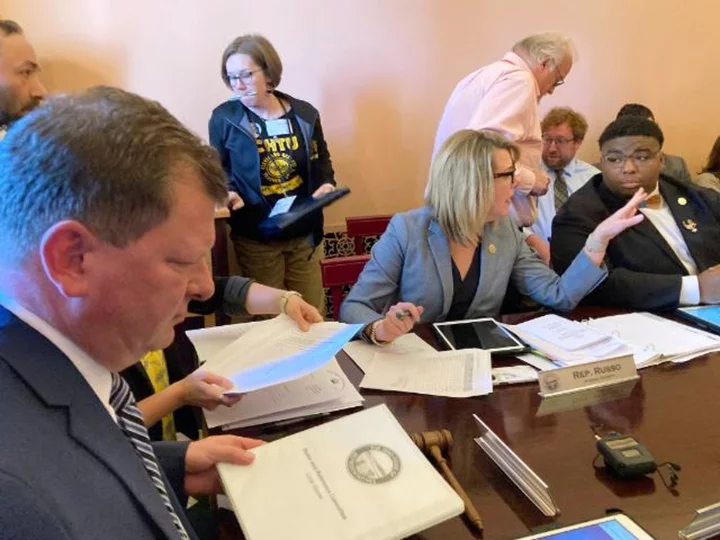On Wednesday, May 10, just after 7:30 a.m., Gabriella Gonzalez and her ex-boyfriend Harold Thompson were arguing near a gas station in Dallas, Texas. Gonzalez had been trying to end things with Thompson after a tumultuous four-month relationship, according to her relatives. Footage from nearby surveillance cameras show the ex-couple arguing and Thompson putting Gonzalez in a chokehold. When she managed to shrug him off, Thompson pulled out a firearm and shot Gonzalez several times. Gonzalez was proclaimed dead by police at the scene of the crime. According to the victim’s family, Thompson killed Gonzalez because she had an abortion in her attempt to exit the relationship.
Gonzalez, who already had three young children who are now motherless, traveled to Colorado to end the pregnancy due to Texas’ abortion ban. According to the victim’s family, Gonzalez’s attempts to leave the relationship enraged Thompson, who police believe was the father of the fetus. “He was so angry that she wanted to get away from him,” Gonzalez’s sister, Mileny Rubio, who was a witness to the shooting, told local news outlet KXAS. “She would always tell me that she wanted to leave, but that she couldn’t.“
Thompson’s violence against Gonzalez and the stripping of reproductive rights in Texas compose a patriarchal structure that seeks to make women subservient to men and to the state. According to Dr. Ann Deslandes, an international reporter and researcher focusing on gender-based violence, in terminating the pregnancy that would keep her tied to her abuser, Gonzalez was attempting to exercise her bodily autonomy — and this is what made Thompson so angry to the point of fatally shooting her.
“Thompson’s violence against Gonzalez and the stripping of reproductive rights in Texas compose a patriarchal structure that seeks to make women subservient to men and to the state.”
nicole froio“Traditional masculinity relies on the male-female gender binary in which the woman’s body belongs to the man; in such a way, men can control reproduction,” Deslandes tells Refinery29 Somos. “If a woman takes control of her own body, for example, choosing to end a pregnancy, that is a threat to the man’s control.”
Gonzalez was killed as a means to exert patriarchal control over her body. Even if Gonzalez had carried the unwanted pregnancy to term, statistically it’s likely that the abuse would have continued, and possibly may have worsened. According to some studies, domestic violence often begins or escalates when a person becomes pregnant. A report by the World Health Organization found that between a quarter and a half of women surveyed in 15 different countries experienced direct trauma to the abdomen during pregnancy. More than 90% of the assailants were the biological father of the unborn child.
Gonzalez’s choice to terminate the pregnancy was a way to protect herself from a violent man who was already controlling her life. “When women are killed by their partners, it’s the final act of control over a woman’s body,” Deslandes tells Somos. “This usually follows a long-term dynamic of control in the relationship.”
“When women are killed by their partners, it’s the final act of control over a woman’s body.”
Dr. Ann DeslandesIn March, Gonzalez’s family had filed a domestic violence report against Thompson, signaling that the violence was not new. In an interview with NBC 5, Gonzalez’s mother said: “I looked at her beaten, he no longer let her talk to anyone, he took everything from her. He took her phone, he managed everything for her. She was scared.”
Violence against Latinas is, sadly, very common. According to the CDC, 34.4% of Latinas experience sexual violence, physical violence, and/or stalking by an intimate partner in their lifetime. The risk of murder in domestic violence situations is five times higher when the victim is attempting to leave her abusive partner. The risk of femicide is also higher when the abusive partner has access to a firearm and when the abuser has previously been physically violent.
It isn’t a coincidence that Gonzalez’s final act of salvation was seeking an abortion, despite its illegality in her home state. Terminating a pregnancy can ensure a victim isn’t tethered to an abuser when leaving is already difficult and high-risk. Research shows that women who give birth to their abusive partner’s offspring are more likely to stay in contact with them, and that homicide is a leading cause of death among pregnant people. The less power women have over their bodies, the less power they will have to leave their abusers.
“In a jurisdiction where abortion is illegal, a woman with a violent partner faces extra barriers to getting away.”
DR. ANN DESLANDES“In a jurisdiction where abortion is illegal, a woman with a violent partner faces extra barriers to getting away,” Deslandes says. “If she is pregnant and does not want to be, she must plan in secret to get away to a place where she can have a safe abortion, risking further violence from her partner. A woman may be forced to stay in a violent relationship and/or to proceed with a pregnancy they do not want.”
Each year, thousands of women all over the world die by femicide. Additionally, almost half of women in some 57 countries, many in Latin America and the Caribbean, do not have the power to make choices over their healthcare, contraception, or sex lives.
Granting all people with uteri safe and protected control over their own bodies, including their right to reproductive care and freedom from violence, is a matter of urgency.









